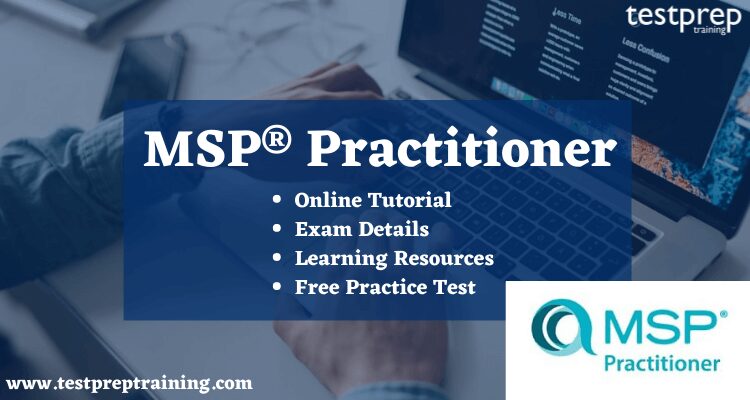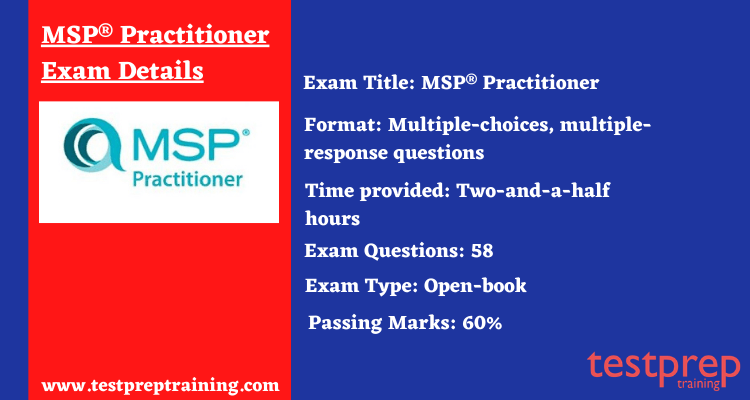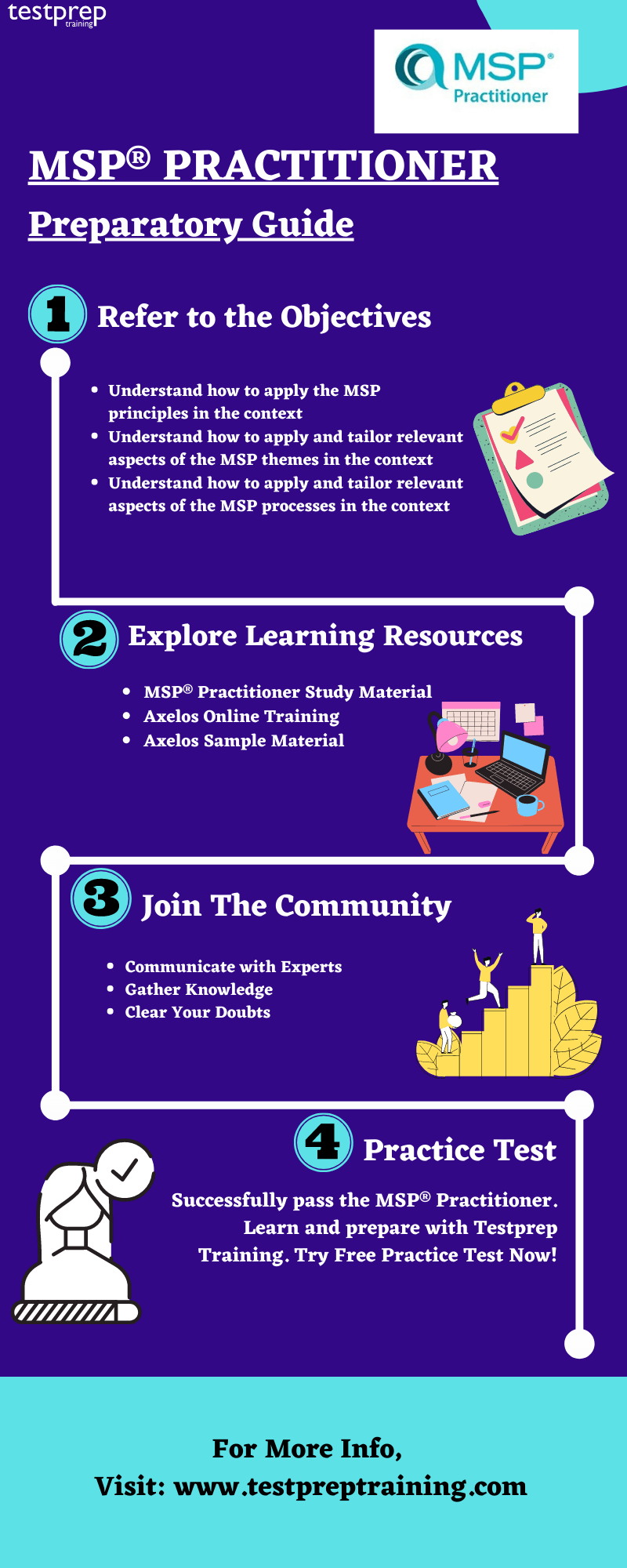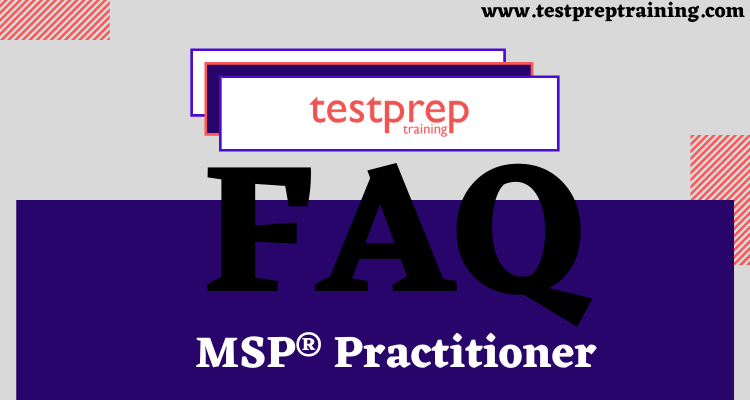MSP® Practitioner

MSP® (Managing Successful Programs®) is a validated framework that coordinates complex programs into flexible, interrelated projects. The MSP training shows better program management skills, increased adaptability, and flexibility when operating in a volatile, ever-changing program environment. The MSP® Practitioner certification by Axelos is pointed at project managers, business change managers (BCMs), and people operating within a Programme Office (PO) or in a professional or governance position. It shows the candidate’s capability to learn and apply the MSP principles, governance problems, and transformational flow methods when managing a program.
MSP consists of a collection of principles, themes, and methods that give a clear roadmap for the program lifecycle, involving larger, more strategic, complex, or multiple projects.
- The principles represent the characteristics of a successful programme.
- The governance themes allow organizations to put the right leadership, organizational structures, and controls in place.
- The processes provide a route through the lifecycle of a programme to deliver the new capability and desired outcomes.
Target Audience
MSP® Practitioner is created for project, program, and business change administrators who want to practice the MSP framework in real-life situations. The practitioner is a must-have certification for both project and program management experts who need to achieve organizational value for their employers and to advance their careers.
The MSP Practitioner qualification is aimed for:
- Programme managers and aspiring programme manager
- Project managers/senior project managers
- Business change managers
- Operational line managers/staff (e.g. process owners) operating within a programme environment
- Other key staff involved in the design, development, and delivery of programmes, including Programme
- Board members (e.g. senior responsible owner), programme assurance, programme management office personnel
- Portfolio management staff
- Specialist programme staff.
Examination Format
Here we are going to discuss the basic information and details about the exam. The MSP® Practitioner Exam Questions are in the form of multiple-choice and multiple-response questions, which will come as an open book test. There will be 58 questions per paper (including 6 matching questions worth 3 marks each), 70 marks available in total. The candidate needs to get 42, a minimum of 60% in order to pass the exam. Also, the candidate will be given Two-and-a-half hours’ to complete the exam. The certification will be valid for 3 years. Moreover, the MSP® Practitioner certification cost is $300 USD

Prerequisites
Before sitting the Practitioner exam, the candidate must first pass MSP 5th Edition Foundation. There is no prerequisite for the MSP 5th Edition Foundation examination.
MSP® Practitioner Course Outline
The MSP® Practitioner exam outline covers the following topics –
Understand how to apply the MSP principles in context
1.1 Analyse the application of MSP principles in context: (tab 4.1, tab 5.1, tab 6.1, tab 7.1, tab 8.1, tab 9.1, tab 10.1)
a) Lead with purpose (2.1)
b) Collaborate across boundaries (2.2)
c) Deal with ambiguity (2.3)
d) Align with priorities (2.4)
e) Deploy diverse skills (2.5)
f) Realize measurable benefits (2.6)
g) Bring pace and value (2.7)
Understand how to apply and tailor relevant aspects of the MSP themes in context
- Assess
- Organization theme
- Design theme
- Justification theme
- Structure theme
- Knowledge theme
- Assurance theme
- Decisions theme
Understand how to apply and tailor relevant aspects of the MSP processes in context
3.1.1 Carry out the ‘identify the programme’ process, demonstrating an understanding of:
a) The activities, inputs and outputs (12.3, tab 12.1, 12.4.1-7)
b) The recommended roles and responsibilities within the process (tab 12.2)
c) How the themes may be applied (tab 12.3)
3.1.2 Analyse whether the ‘identify the programme’ process activities, roles and responsibilities are effective and fit for purpose, taking into consideration: the programme’s environment, the MSP principles, the themes, and the purpose and objectives of the process (chapter 12)
3.2.1 Carry out the ‘design the outcomes’ process, demonstrating an understanding of:
a) The activities, inputs and outputs (13.3, tab 13.1, 13.4.1-11)
b) The recommended roles and responsibilities within the process (tab 13.2)
c) How the themes may be applied (tab 13.3)
3.2.2 Analyse whether the ‘design the outcomes’ process activities, roles and responsibilities are effective and fit for purpose, taking into consideration: the programme’s environment, the MSP principles, the themes, and the purpose and objectives of the process (chapter 13)
3.3.1 Carry out the ‘plan progressive delivery’ process, demonstrating an understanding of:
a) The activities, inputs and outputs (14.3, tab 14.1, 14.4.1-6)
b) The recommended roles and responsibilities within the process (tab 14.2)
c) How the themes may be applied (tab 14.3)
3.3.2 Analyse whether the ‘plan progressive delivery’ process activities, roles and responsibilities are effective and fit for purpose, taking into consideration: the programme’s environment, the MSP principles, the themes, and the purpose and objectives of the process (chapter 14)
3.4.1 Carry out the ‘deliver the capabilities’ process, demonstrating an understanding of:
a) The activities, inputs and outputs (15.3, tab 15.1, 15.4.1-7 (including 15.4.2.1- 2))
b) The recommended roles and responsibilities within the process (tab 15.2)
c) How the themes may be applied (tab 15.3)
3.4.2 Analyse whether the ‘deliver the capabilities’ process activities, roles and responsibilities are effective and fit for purpose, taking into consideration: the programme’s environment, the MSP principles, the themes, and the purpose and objectives of the process (chapter 15)
3.5.1 Carry out the ‘embed the outcomes’ process, demonstrating an understanding of:
a) The activities, inputs and outputs (16.3, tab 16.1, 16.4.1-6)
b) The recommended roles and responsibilities within the process (tab 16.2)
c) How the themes may be applied (tab 16.3)
3.5.2 Analyse whether the ‘embed the outcomes’ process activities, roles and responsibilities are effective and fit for purpose, taking into consideration: the programme’s environment, the MSP principles, the themes, and the purpose and objectives of the process (chapter 16)
3.6.1 Carry out the ‘evaluate new information’ process, demonstrating an understanding of:
a) The activities, inputs and outputs (17.3, tab 17.1, 17.4.1-5)
b) The recommended roles and responsibilities within the process (tab 17.2)
c) How the themes may be applied (tab 17.3)
3.6.2 Analyse whether the ‘evaluate new information’ process activities, roles and responsibilities are effective and fit for purpose, taking into consideration: the programme’s environment, the MSP principles, the themes, and the purpose and objectives of the process (chapter 17)
3.7.1 Carry out the ‘close the programme’ process, demonstrating an understanding of:
a) The activities, inputs and outputs (18.3, tab 18.1, 18.4.1-4)
b) The recommended roles and responsibilities within the process (tab 18.2)
c) How the themes may be applied (tab 18.3)
Visit: MSP® Practitioner FAQ
Exam policies
The exam policies for the AXELOS certifications include the Exam term and conditions, renewal and recertifications, examination prerequisites, failing and retaking the exam, privacy and policy regarding the examinations. We suggest candidates to once visit the official site of AXELOS and read all the related information.
MSP® Practitioner Exam: Learning Resources
MSP® Practitioner exam preparations are quite tough. To earn the certification you need a focused approach. The Exam needs complete learning, understanding, and hard work. So, here we are suggesting some steps which the candidate can refer to and prepare for the exam with our MSP® Practitioner Study Guide.

Refer to the Exam Objectives
Learning MSP® Practitioner Exam domains is severe, but it’s also vital to understand the exam model so that you’ll feel completely confident. It is highly advised to review each and every objective rigorously. This includes reviewing each topic and its respective sub-topic. Don’t forget to do your homework before you begin with your preparation as it will help you to stay on the same page as the MSP® Practitioner exam.
MSP® Practitioner Study Material
AXELOS has produced a series of study resources that the candidates can use to help prepare for the exam. These papers will guide you on how the questions are typically presented and you can use them to test your knowledge and understanding while you study. However, remember that the actual questions you receive in your examinations will differ from the examples in these papers.
Online Training
Practitioner training typically lasts for two and a half days and the examination generally takes place at the end of the training, depending on the training provider. Interested candidates can also opt for self-study for the Foundation exam and may choose to take training in another format, such as distance learning. Training is delivered by AXELOS’ Accredited Training Organizations, who set their own rates.
Grab Some Books
The next step should be gathering some books. The candidate should go for the MSP® Practitioner Exam Books to get a complete understanding of the exam concepts. To make your work easy, we are recommending some books below which you can refer to:
- MSP® Programme Management Practitioner Courseware – English by Douwe Brolsma, Mark Kouwenhoven, et al.
Joining Community
During the preparation for an exam, joining online groups or communities can be really beneficial. That is to say, there you can discuss any of your queries and get the best possible answer. Moreover, these groups have professionals that will keep you up to date with the latest happenings for the MSP® Practitioner exams with all the great content that AXELOS Community offers.
Practice Test
MSP® Practitioner Practice test is the most valuable resource in the preparation guide. Once the candidate believes that they are prepared enough then they can try their hands on the practice test. The practice test will help the candidate to acknowledge their weak areas so that candidate can word upon them.


